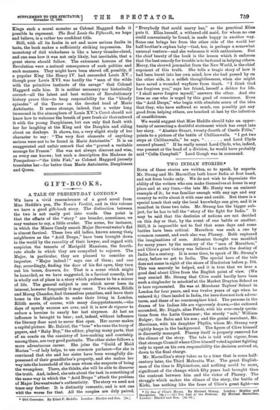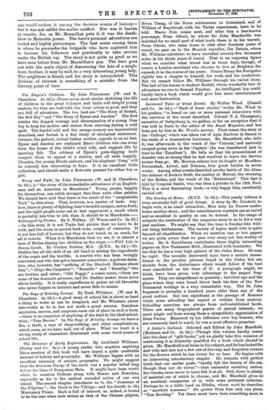TWO INDIAN STORIES.*
BOTH of these stories are written, so to speak, by experts. Mr. Strang and Mr. Macmillan both know India at first hand, and not from books only. We do not wish to depreciate the ability of the writers who can make themselves at home in any place and at any time,—the late Mr. Henty was an eminent example of it; he was familiar enough with any age and any country to write about it with ease and credit. But there is a special touch that only the local knowledge can give, and it is manifest in these two tales. Mr. Strang has the bigger sub- ject, for he has to tell the " story of the fight for India." It may be said that the destinies of nations are not decided on this day or that, by the event of one battle or another. Still, it is impossible not to feel that some days and some battles have been critical. Marathon was such a one by common consent, and such also was Plassey. Both captured the imaginations of men. Athenian thought was moulded for many years by the memory of the " men of Marathon," and Clive's great victory was believed to settle the destiny of India for a century. It is some time, to speak of Mr. Strange story, before we get to India. The special hero of the tale does not come in sight of the shore of Hindostan before p. 104. This can scarcely be helped, and it is true that we hear a good deal about Clive from the English point of view. (We may remind Mr. Strang that Clive could hardly have been such a ringleader in mischief at the Market Drayton School as is here represented. He was at Merchant Taylors' School in London for four years, and was twelve years of age when he entered it.) Once landed in India, the hero does not lack adven- tures, and these of no commonplace kind. The persons in the drama of his Indian life are vigorously drawn,—the cultured scoundrel, Mr. Diggle, alias Peloti, with his ever-ready quota- tions from the Latin Grammar ; the sturdy "salt," William Bulger ; the Babu and his son ; and the genial merchant, Mr. Merriman, with his daughter Phyllis, whom Mr. Strang very rightly keeps in the background. The figure of Clive himself is discreetly managed. Plassey itself is properly reserved for the climax of the story. The tale is told with vigour, from that strange Council where Clive himself voted against fighting only to upset on his own responsibility the decision arrived at, down to the final charge.
Mr. Macmillan's story takes us to a time that is some half- century later, the Third Mahratta War. The great English- man of the time is Elphinstone, and nothing could he more, significant of the change which fifty years had brought than the contrast between him and the victor of Plessey. The struggle which makes the climax of the story, the battle of Kirki, has nothing like the fame of Clive's great fight—no
* (1) One of Mires Heroes. By Herbert Strang. London : Hoddor and Stoughton. (aa.J—(2) The Last of the Peshwas. By Michael Macmillan. London: BLsekie and Son. 12s. ad. 1
one would reckon it among the decisive events of history— but it was not unlike the earlier conflict. Nor was it barren in results, for, as Mr. Macmillan puts it, it was the death- blow to Mahratta power. The hero's personal adventures are varied and highly picturesque. The best scene among them is where be persuades the brigands who have captured him to become his followers and practically to take service under the British raj. The story is not quite as good as we have seen before from Mr. Macmillan's pen. The hero goes out with the main object of discovering the fate of a neigh- bour, brother, it may be said, to a very interesting young lady. The neighbour is found, and his story is interpolated. This division of interest is something of a mistake from the literary point of view.



























































 Previous page
Previous page